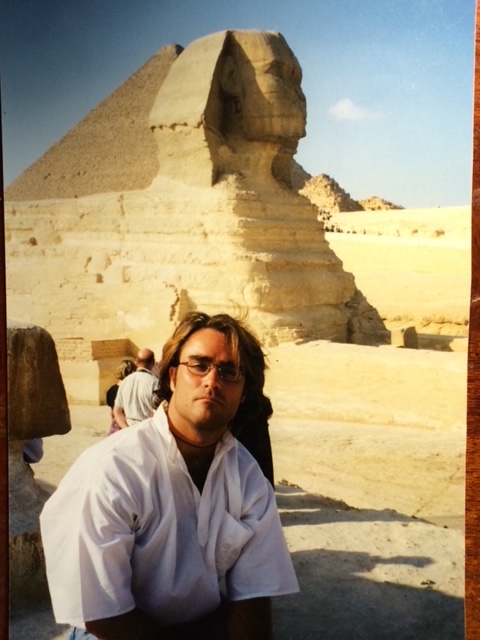
I can understand why an eager archaeologist (along with various Egyptian Antiquities authorities) has been trumpeting the possibility of finding Cleopatra’s tomb beneath the ruins of a large temple site near Alexandria. Stoking the media-hungry fires of imagination generates great publicity for Egyptian tourism overall—I presume that authorities are eager to develop the Osiris and Isis temple at Taposiris Magna as a tourist destination—and the excitement certainly guarantees additional funds for Egyptologist Martinez’s ongoing exploration.
But the hoopla is, as usual, a lot of misdirected noise. There has never been any historical evidence or tradition that Cleopatra or Marc Antony were entombed at all, much less at a temple site fairly well-removed from their infamous last stand in Alexandra proper, as the forces of Octavian drew near for the final coup de grace that would launch a thousand tales of asps smuggled inside baskets of figs and a deceased Cleo dressed in all her royal finery and laid-out in resplendence upon her bier, handmaids dying beside her.
Mark Antony’s body may have been vouchsafed some form of semi-dignified burial; though he was considered a traitor to the Roman republic and therefore a sworn enemy, he was still a Roman citizen. Swift disposal in an unmarked grave would have been a likely fate for his remains; Octavian, flush with both anger and an exhilarating sense of triumph over his adversaries, may have been inclined to provide that much dignity to Antony, flimsy though it would have been.
Cleopatra, however, is a much different story. Despised by both Octavian and the rest of the Roman citizenry for her machinations with both Caesar and Antony, as well as her military overtures, the plan was to capture the defeated queen alive and transport her back to Rome, where she would be led through the streets in chains and subjected to exceeding humiliation—a legendary prize reduced to abject ruin for the jeering of thousands lining the streets of Octavian’s Triumph, his victory parade.
If the legend of Cleopatra’s last-minute suicide is true (and there is good reason to think that it is, though any number of poisons were more likely her mode of self-destruction rather than the romantic asp-in-a-basket trope), then Octavian would most likely have been irritated to discover that his nemesis had foiled his plans to desecrate her honor in a Roman spectacle. There would have been no nominal respect for her standing as Queen of Egypt. No way. Octavian hated her.
Moreover, the manner of Cleopatra’s burial—had she been given a proper one—would have had enormous religious and political repercussions alongside the already smoldering powder-keg of Egypt’s imminent absorption as a Roman colony. To have given Cleopatra some sort of regal burial in Alexandria would only have inflamed the hearts of the populace for their beloved monarch and stoked the fires of resentment against their conquerers from across the sea. To bury Cleopatra in the traditional Egyptian manner—even discreetly—beneath the foundations of a glorious temple like the one at Taposiris Magna would have been a political gaffe of astonishing proportions. The queen had already identified herself in her lifetime with the great goddess Isis, lifting herself to the level of semi-deification. Burying her in a traditional tomb at all, much less a tomb within a temple precinct, would have invited the ministrations of a popular cult to arise around the deceased Queen, further fomenting resentment and potential insurrectionist attitudes.
Octavian was far too intelligent to have made such a blunder. Even Cleopatra’s son, Caesarion, was easily murdered and likely left in some remote, desolate locale to rot and be eaten by animals during the escape attempt his mother had prearranged for his survival. The son of Caesar himself, bastard though he was considered by Rome, was hardly the recipient of any respectable interment, and Cleopatra’s power and allure cast far greater shadows than that of her ill-fated progeny.
From a political standpoint, Octavian would likely have told his new subjects that their Queen had been buried respectfully, discreetly, and secretly, the location of her tomb unknown. The matter would have been ended on a note of ambiguity, neutralizing any excessive swings of public sentiment. But Octavian being Octavian, it is not likely that he accorded Cleopatra the slightest element of traditional Egyptian embalmment, which would have required months of religious and magical ritualization, attended by witnesses galore, further fueling a period of organized mourning and probable furor.
No. Political stability at such a moment was paramount and Octavian was every inch the ruthless man he was said to be. In secret, he probably had Cleopatra’s body taken out to sea, weighted down, and dumped into the unfathomed shadows beneath the moonlight. If he was especially vicious, he threw her body to jackals on the outskirts of the desert or to crocodiles in the heart of the delta marshes. That would probably have given him immense satisfaction and Cleopatra’s people would have been none the wiser. The great Queen’s final fate was expedient by necessity, leaving no trace for her once-devoted subjects to follow or to later develop into religious and politically charged significance. She was almost certainly not buried with honor in a tomb beneath this temple they are currently attempting to showcase. I guarantee it.
Read about the present excavations (and publicity efforts) in the JERUSALEM POST.
_________________________________________________________
#Cleopatra #MarkAntony #TombOfCleopatra #Octavian #AncientEgypt #GoddessIsis #TaposirisMagna #JerusalemPost #EgyptianTemple #AuthorJonathanKieran #JonathanKieran #WriterJonathanKieran #CaliforniaLife #OnTheEdge #Wistwood #JonathanKieranTheAuthor #JonathanKieranMusic #JonathanKieranNewAlbum #JonathanKieranArtist #Jericho #JonathanKieranJericho #JerichoAlbum #WritersOfInstagram #ArtistsOfInstagram #AuthorsOfInstagram
Leave a comment